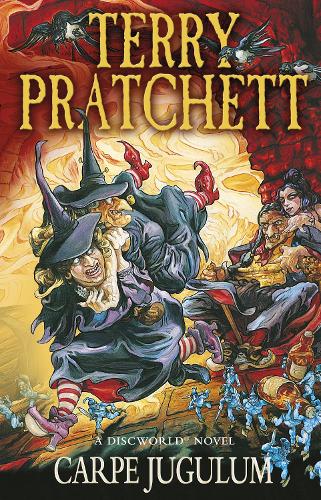We have, it has to be admitted, been here before. Lancre, to be specific, the mountain home of Terry Pratchett’s wonderful witches, the awesome Granny Weatherwax, Nanny Ogg, Magrat Garlick, and Agnes Nitt. (And yes, that’s four witches, which is one too many, and a bit of a problem). Magrat, recently married to King Verence, has had a daughter, and people from far and wide have been invited to the christening. Unfortunately for all concerned, in an attempt to be progressive Verence has invited guests from Uberwald, a neighbouring kingdom inhabited by vampires. The vampires, once invited into the castle, begin to take over and snack on the locals. The witches are not standing for this of course, and battle begins.

If you have been paying attention, and why would you, bells will start ringing at this point. Isn’t this pretty much exactly the plot of Lords and Ladies (Discworld 14) published some six years earlier? Superficially charming but sinister and other-worldly villains are accidentally invited into Lancre, take over, and battle with the witches? Pretty much.
The good news is that all this doesn’t matter in the slightest. Shakespeare recycled plots freely and unapologetically, so why couldn’t Sir Terry? Any time spent with the profound moral philosopher that is Granny Weatherwax, Pratchett’s finest creation, is time well spent, even if we have been here before. And this is a very brave book – not many fantasy writers would go to the dark places that Granny visits when she is called out to a difficult home birth, and is faced with the choice of saving the mother’s life or the child’s. When Mrs Patternoster, the local midwife, suggests the choice of who to save should have been offered to the husband/father, Granny replies:
You don’t like him? You think he’s a bad man? ,,,Then what’s he done to me, that I should hurt him so?”
Granny takes the pain of the decision, both literally and psychologically, on her own shoulders, so that others might not have to. This is such a shockingly brave and moving scene, showing how hard and sometimes lonely the lives of the witches are.
Another fresh feature to this story is the character of Mightily Oats. or more specifically the Quite Reverend Mightily-Praiseworthy-Are-Ye-Who-Exalteth-Om Oats, an Omnian missionary priest called in to officiate at Magrat and Verence’s daughter’s naming ceremony in the absence of the local priest who has been injured in a fall from a donkey. Oats is one of the ordinary-man characters Pratchett writes so well. He is devout in his faith in Om, but questions some of the teachings of his schismatic church. He is determined to do the right thing, even confronting vampires, when his every instinct is to run away. This is Mightily’s coming of age story. He starts the novel as a callow, frightened priest amongst the heathen folk of Lancre, particularly (and rightly) scared of the local witches. By the end of the novel he has earned their grudging respect, and slowly come to terms with his religion.
“Even when he was small there’d been a part of him that thought the temple was a silly boring place, and tried to make him laugh when he was supposed to be listening to sermons. It had grown up with him. It was the Oats that read avidly and always remembered those passages which cast doubt on the literal truth of the Book of Om—and nudged him and said, if this isn’t true, what can you believe?
And the other half of him would say: there must be other kinds of truth.
And he’d reply: other kinds than the kind that is actually true, you mean?
And he’d say: define actually!”
Carpe Jugulum also features the first appearance of the wonderful wee free men, the Nac Mac Feegle. The Feegles are a force of nature, and another fantastic addition to the Discworld universe, who of course were to go on and feature in their own series of novels. Scrivens!
Carpe Jugulum also features an Igor. I am not sure if this is the first appearance of Igor’s in Discworld (I think it might be) who is the servant of the invading vampires, and a part-time plastic surgeon of considerable skill. He is a traditionalist who spends his spare time breeding spiders, making sure the doors creak eerily, and generally trying to keep the old ways alive. Igor’s ancestral home is Dontgonearthe Castle, which tells you as much as you need to know about some of Pratchett’s jokes.
By now Discworld is a richly featured landscape full of much-loved characters with extensive backstories. This makes immersing yourself into a novel like Carpe Jugulum a wonderfully comforting and entertaining experience.



